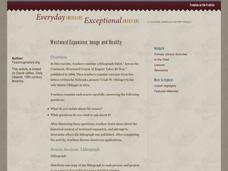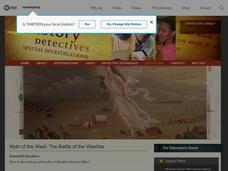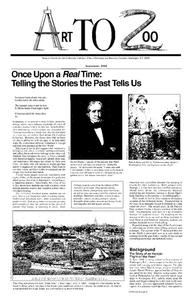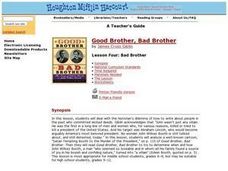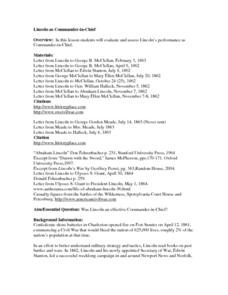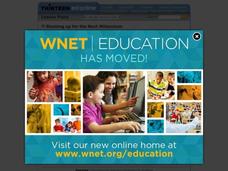Curated OER
Lesson: Stepping into the Past
How have things changed from the past until now? Young art historians examine a screen painted in Mexico during the 1700s. They discuss the differences between a garden party then and now. They then write a journal entry about the party...
University of North Carolina
History
The past helps to inform the present and the future—that's why the study of history is so important. The handout describes what historians do and why their jobs are meaningful. Readers learn about what to expect in a college-level...
Curated OER
Understanding Clues from the Past: School Days
Third graders read primary and secondary sources as the study about schools in the early years of Kansas. In this primary and secondary source lesson, 3rd graders examine how historians use primary source documents to tell about the past...
Curated OER
A Walk Through the Past: A Grave Undertaking
Students explore how historians construct a story out of fragments of the past; a discussion of nineteenth century poetry and art leads students to connect art and literature to their place in time.
University of Minnesota
Making an Immigrant Story
Budding historians research the trip immigrants to the United States take and the reasons behind their willingness to start over in a new place. Groups create their own video lessons outlining the story of human migration from departure...
Roy Rosenzweig Center for History and New Media
Westward Expansion: Image and Reality
As your young historians study Westward Expansion, practice in-depth primary source analysis with the documents and guidelines presented in this resource. They will examine a lithograph and excerpts from two letters written by a Nebraska...
Curated OER
Learning from the Past: A New Approach
Young scholars research nonprofit organizations. As they research, they learn how those living in the colonial period formed community organizations to provide for the common good of their society. Each pupil chooses one organization to...
Briscoe Center for American History
Applying the SOAPS Method of Analyzing Historical Documents
Young historians use the SOAPS (Speaker, Occasion, Audience, Purpose, Subject) method of questioning to determine the historical value of primary source documents. The third in a series of five lessons that model for learners how...
Park City Historical Society & Museum
Oral History Interview Questions Worksheet
What is an oral history interview? What goes into the planning and what should be said? Why is it important that we know and learn from oral history? This is an excellent worksheet to support your young historians as they conduct...
Curated OER
Go for the Gold!
The options are vast with this Ancient Greece and Olympics research project! Using Scholastic online resources, historians have interactive and educational supports to guide them through researching and writing about the 2004 Olympics in...
Civil War Trust
Civil War Photography: Photography as a Primary Source
Can we learn a thing or two about history by looking at pictures from the past? As young historians view 2-D and 3-D primary source photographs, they respond to a series of worksheets that guides them toward unveiling clues about the past.
PBS
Myth of the West: The Battle of the Washita
Go West, young man! Scholars use PBS video clips, slide shows, and interactive materials to create a picture of Manifest Destiny in the American West. Using a variety of primary and secondary sources, young historians learn about the...
Curated OER
Rediscovering Forgotten Women Writers
Women's voices are becoming more prominent in the world of literature, but for centuries, this wasn't the case. Young historians research a woman whose writings are considered to be lost, out of print, or forgotten. They develop an oral...
K12 Reader
Summarize It: President Theodore Roosevelt's 7th Annual Message to Congress
How did Theodore Roosevelt stress the importance of conservation during his time as president of the United States? Take a closer look at the language Roosevelt used himself in a 1907 address to Congress, and have your young historians...
Curated OER
Telling the Stories the Past Tells Us
Young scholars create historical stories based on factual evidence. For this Telling the Stories the Past Tells Us lesson, students write historical stories using strategies such as characters, plot, setting, and voice. Young scholars...
Briscoe Center for American History
Identifying Primary Source Documents
Who is Mary Maverick and why is she important? the focus of this, the second in a series of five lessons that are designed to introduce middle schoolers to how historians use primary source documents to understand the past, is on how to...
Curated OER
Face to Face with the Great Depression
Young scholars develop an analytical perspective of how historians record, preserve, and interpret data. In this US history lesson students read and interpret personal accounts of the Great Depression. They discuss how interpretation...
Curated OER
Bad Brother
Students deal with the historian's dilemma of how to write about people in the past who committed wicked deeds. They analyze a well-known cartoon, "Satan Tempting Booth to the Murder of the President."
Curated OER
Baseball Memories
Students act as historians by, first, reading and analyzing oral histories of professional baseball players to become familiar with baseball figures. Then, they proceed to interview family members, relatives, or neighbors who have...
PBS
Looking for Lincoln Throughout His Life
Young historians gather information about Abraham Lincoln through a variety of activities. They match vocabulary words with pictures to create a timeline. Additionally, learners read books and articles that teach them about Lincoln's...
Curated OER
They Called Him Sequoyah
Students become familiar with George Gist and his life as a Cherokee. In this Cherokee lesson, students research the ways people have communicated in the past and presently. Students recognize that better communication could have...
Curated OER
U.S. History: Lincoln As Commander-In-Chief
Young scholars examine and determine Abraham Lincoln's effectiveness as commander-in-chief during the Civil War. Role-playing as historians, they write essays evaluating Lincoln's performance after conducting Internet research from...
Curated OER
Stocking Up For The Next Millennium
Look back on the inventions, concepts, cultural items, and literary contributions of the past one hundred years. Young historians will compose a presentation based on the research they do in favor of one thing that should withstand the...
Curated OER
How Do They Know That
Young scholars explore methods for reconstructing the past. In this forest succession lesson, students examine forest succession and how to read the land in order to predict patterns of change. Young scholars will visit a historical...







